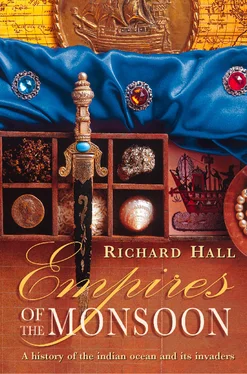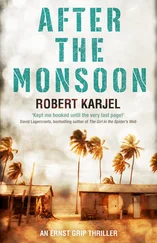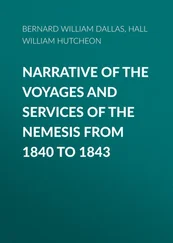Most puzzling of the stone structures at Great Zimbabwe is a conical tower, dominating the largest enclosure. Built of granite blocks, with a core of rubble, it hides no treasure, nor does it guard a royal grave. Meaningless today, the tower was so carefully constructed that it must have carried a precise message to all who saw it in the capital’s time of greatness. Perhaps this represented an African grain store, to assure the people that the king cared about their welfare and would never let them starve. Legend says that this enclosure, more than 800 feet in circumference, within which the tower stands, was built for the ruler’s senior wife. So this might have been yet another symbol proclaiming the virility of the royal line. Two entrances to the enclosure were marked with male and female symbols: a horn and a groove.
For the king’s humbler subjects, in their clusters of huts below the acropolis, life was little different from that in any village on the plateau. Water still had to be carried by the women from the nearest stream, firewood collected, grain pounded and cooked, the dark red earth of the gardens hoed; children looked after the goats and chickens; menfolk herded cattle, hunted game, moulded clay cooking pots, and prepared for war with their spears and clubs when orders came down from the acropolis. Much beer was drunk, especially on feast days such as the new year, when the king’s fire was rekindled and all other fires lit from it.
Existence was governed by fantasy and superstition. When the rainy season did not start on time the people took part in sacrifices at shrines where unseen ‘owners of the land’ had to be appeased. If such sacrifices failed to induce enough rain, women spirit mediums were consulted.
It was a mark of their spirit power – and, without doubt, their ruthlessness – that Great Zimbabwe’s monarchs held their subjects together for centuries around the nucleus of a city-state. But there was a fatal limitation: the ability to keep records was never mastered, nor was any form of writing borrowed from the Indian Ocean cultures with whom the gold trade had put its rulers in touch. In the course of more than three hundred years, coundess trade caravans were sent to the coast, where the leaders would have seen accounts being recorded in Arabic. Emissaries must likewise have travelled inland, bearing written messages to be read out to the king of what the Arabs called ‘Zabnawi, the land of gold’. More than any other sub-Saharan society, Great Zimbabwe had the opportunity and the need to start keeping written records, yet failed to take the decisive step to literacy. 7
Instead, it was stultified by clinging to the oral culture of African rural life. When a ruler felt the need to send tidings or commands to an outlying village he would choose a courier who could be relied upon to memorize his words. During a long journey the courier would tie knots in a string to record how many days it had taken, and on his return the string was saved for future reference. Various methods of arithmetic were used and bundles of sticks tied with cords or marked with notches were used as tallies in trade.
Religious practices remained simple: there was no scholarly priesthood dedicated to setting down the precise form of rituals and the days in the calendar when they must be performed. The lunar months were divided into three weeks, made up of nine or ten days. Law-giving was not based upon written statutes, but on social customs, and the interpretation of signs. Above all, the spirits of the ancestors permeated everything in life: the spirit world was indivisible from reality and existence was as repetitive as the seasons. The keeping of records would have meant a linear progression in time, a rejection of the past, but the presence of the spirits weighed heavily against that.
A civilization could not be built on the shifting sands of memory alone, and black Africa’s only literate people, apart from the Muslim converts of West Africa and the Zanj coast, remained the Ethiopians, far away in the north-east, using their ancient Ge’ez language. All the wealth of the gold trade had failed in the end to transmute the fundamental nature of Great Zimbabwe’s society. 8
As Al-Mas’udi had discovered in the tenth century, wealth in cattle was what always mattered most in southern Africa: from early times, figurines of oxen had been revered and cattle were ceremonially buried. The king ruled the herd as he ruled the people; he was, in reality, just the most powerful pastoralist. So when some insoluble problems confronted the state, shortly after 1400, Great Zimbabwe was simply abandoned. With his cattle and his people, the king moved on.
What tolled the knell of Great Zimbabwe can only be guessed at. It may have been a conflict among the rulers over the succession, or a long drought and the exhaustion of the soil. Equally possible, there was a sudden advance of the lethal tsetse fly from the lowlands, attacking both the cattle and the people.
The king who ordered the abandonment of Great Zimbabwe after almost four centuries is said to have been called Nyatsimba Mutota. He went north, nearer to the Zambezi river and the gold-mines of the high plateau, and founded the empire of the Mwene Mutapa. This became translated as Monomotapa, and was to appear on maps for many centuries as a mighty state of the African interior. Yet Monomotapa was never as powerful as Great Zimbabwe, whose flecked grey stones leave so many questions unanswered.
The acropolis and the enclosures may have been an almost chance response to economic prosperity: there merely happened to be more stone available than wood, since so many trees had been cut down to make charcoal for smelting. Alternatively, Great Zimbabwe could be seen as the unfulfilled prelude to the development of a distinctly African civilization; in their new home the Karanga people might have gone on to adapt to literacy and organize a fully-fledged state based upon it. History did not grant time for such possibilities to be resolved, because Africa south of the equator was about to enter a new era.
PART TWO
TWELVE
Prince Henry’s Far Horizons
Bell, book and candle shall not drive me back,
When gold and silver becks me to come on.
—Shakespeare, King John , III, iii
THE YEAR 1415 was memorable for the kings of Portugal and England, for each had a feat of arms to celebrate. In August an armada of small ships from Lisbon had captured the Moorish town of Ceuta, on the North African coast, and in October the bowmen of England routed the French at Agincourt. For Henry V, victory had been hard won, whereas John of Portugal’s losses – only eight men killed – were almost absurdly light. This was because the governor of Ceuta, having summoned a Berber force to help defend the town, sent it home too soon; he had decided that the attack was never going to materialize because of reports that the 240 Portuguese craft sailing towards him were too tiny and ill-manned to contend with the winds and currents in the Strait of Gibraltar. (The ships were a motley assortment, some being hired from England for the occasion against a promise of payment in consignments of salt.)
In the event, a good number of Muslims were slaughtered, their houses and stores were thoroughly looted, and the Pope declared the undertaking to be a holy crusade. The main mosque was turned into a church. King John proudly declared that he had ‘washed his hands in infidel blood’, to make amends for any offences he might have committed against God in his daily life, and set about celebrating the thirtieth anniversary of his reign. 1
It was certainly spectacular to capture and keep a town in North Africa, especially one so strategically placed only fifteen miles across the water from Gibraltar. Ceuta, just east of Tangier, boasted a history going back to Roman times, and the Arabs had used it in the past to control shipping in the western Mediterranean. The Portuguese were also happy to outshine their rivals the Castilians, who sixteen years earlier had raided Tetuan, a town not far from Ceuta; half of Tetuan’s citizens were massacred and the rest enslaved, but then the Castilians withdrew. The aims of the new masters of Ceuta were less fleeting.
Читать дальше












